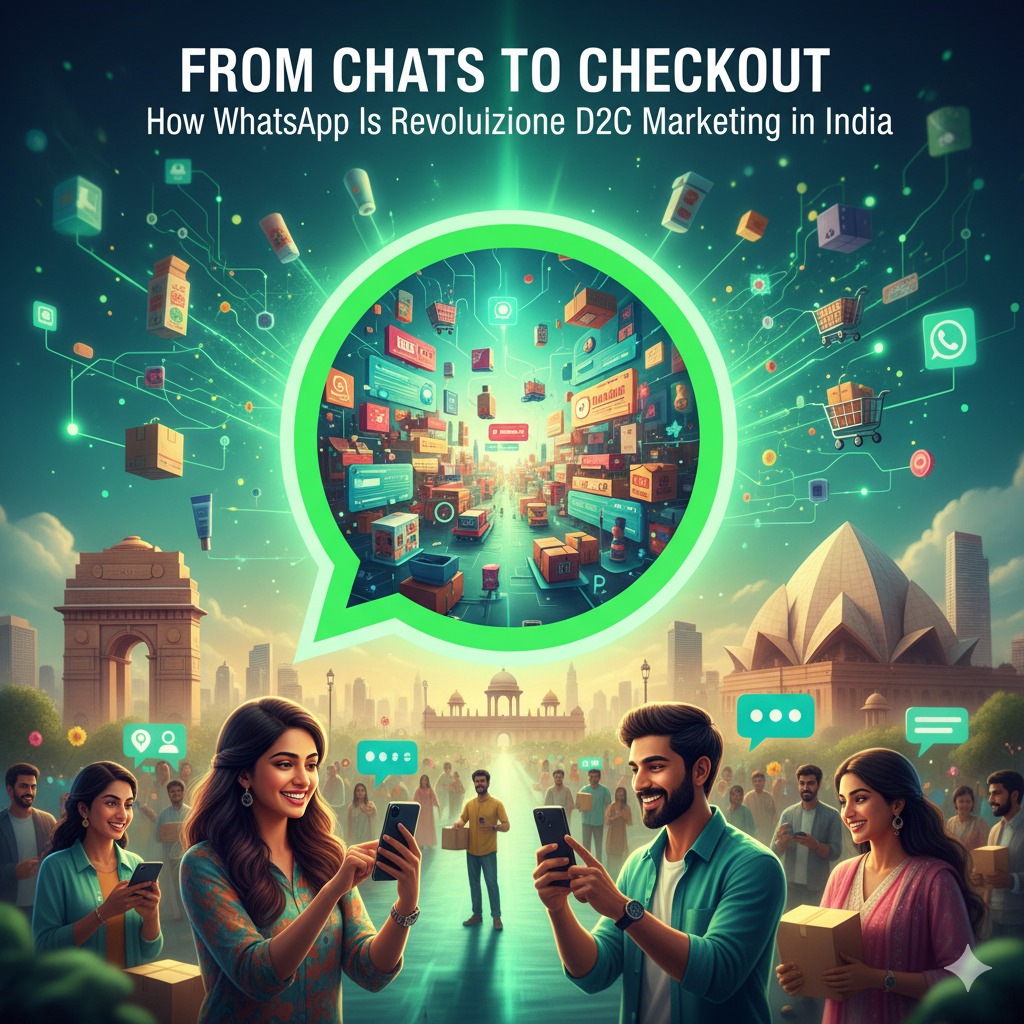Businesses will never be able to connect with customers in India the same way again. Most online shopping used to start on websites or apps a few years ago. But WhatsApp Commerce is making the customer journey easier, faster, and more personal these days. WhatsApp has quietly become the new face of direct-to-customer (D2C) marketing in India, going from a simple “Hi” on chat to placing an order in just a few taps.
WhatsApp is changing the game for brands that want to cut through the noise of busy e-commerce sites and talk to customers directly. Let’s look at how this green chat app is changing D2C marketing in India and why businesses can’t afford to ignore it.
Why WhatsApp for D2C Marketing?
India has over 500 million WhatsApp users, making it the country’s most widely used communication platform. For many Indians, WhatsApp is not just an app—it’s a daily habit. Whether it’s chatting with friends, sharing updates, or joining community groups, people spend more time on WhatsApp than on most social media platforms combined.
Now imagine: instead of asking customers to visit your website, download an app, or go through multiple steps, you bring your store to where they already are—WhatsApp. That’s the power of WhatsApp Commerce.
For businesses looking to leverage this power effectively, working with experts like Webcoder – the best digital marketing company in Dehradun – can make all the difference in creating personalized, high-converting customer experiences.
For D2C brands, this shift means:
-
Direct access to customers without middlemen like e-commerce giants.
-
Higher engagement rates compared to emails or SMS.
-
Personal, real-time conversations that build trust.
-
Faster checkout experiences with integrated payment solutions.
From Awareness to Purchase – The WhatsApp Funnel
The magic of WhatsApp lies in its seamless marketing funnel. Here’s how it works:
-
Discovery – Customers see a brand’s WhatsApp number on ads, websites, or social media. A simple “Hi” starts the conversation.
-
Engagement – Automated responses, catalogs, and personalized recommendations keep customers hooked.
-
Conversion – With built-in payment options like UPI, credit cards, and COD, customers can complete purchases within WhatsApp itself.
-
Retention – Follow-ups, offers, and updates keep the customer relationship alive long after the first sale.
This end-to-end flow, from chats to checkout, eliminates friction and makes shopping more conversational.
The Human Side of WhatsApp Marketing
Unlike traditional marketing channels, WhatsApp feels personal. A notification here doesn’t feel like spam; it feels like a message from a friend. This makes it incredibly powerful for humanized brand interactions.
For example:
-
A skincare brand can send personalized product recommendations based on customer queries.
-
A fashion D2C brand can share new arrivals with photos and catalogs directly in chat.
-
A food delivery service can update customers on their order status in real time.
By blending automation with human-like interaction, brands create a sense of trust, warmth, and accessibility—qualities that every Indian consumer values.
Why India Is Ready for WhatsApp Commerce
Several factors make India the perfect playground for WhatsApp-driven D2C growth:
-
Mobile-First Nation – Most online users in India access the internet through smartphones. WhatsApp is already pre-installed on almost every device.
-
Trust in Conversations – Indians trust one-on-one conversations more than cold ads or generic emails. WhatsApp feels safe and authentic.
-
UPI & Digital Payments Boom – With UPI integrated into WhatsApp, checkout has become smoother than ever.
-
Tier-2 & Tier-3 Expansion – For many small-town users, WhatsApp is their first and only online shopping gateway.
Together, these factors make WhatsApp a goldmine for D2C brands that want to scale beyond metro cities.
Challenges in WhatsApp Commerce
Of course, it’s not all smooth sailing. Businesses often face challenges like:
-
Over-messaging risk – Too many promotions can annoy customers.
-
Automation vs. personalization – Striking the right balance between bots and real human touch is tricky.
-
Data privacy concerns – Customers are cautious about sharing personal information on chat.
-
Scalability – Managing thousands of chats requires strong CRM and automation tools.
Ignoring these challenges can turn a golden opportunity into a failed experiment.
Solutions – How Brands Can Win on WhatsApp
To truly unlock WhatsApp’s potential, D2C brands must focus on smart, customer-first strategies. Here’s how:
-
Respect the Space – Treat WhatsApp like a personal inbox, not a spam folder. Focus on value-driven messages like exclusive offers, updates, or helpful content.
-
Use Automation Wisely – Chatbots can handle FAQs and simple queries, but always keep a human option open for complex issues.
-
Build Trust Through Transparency – Clearly mention opt-in policies, data usage, and give customers the freedom to unsubscribe.
-
Personalize Everything – From using the customer’s name to recommending products based on past purchases, personalization drives loyalty.
-
Leverage WhatsApp Business API – With advanced tools, brands can manage bulk conversations, integrate CRMs, and streamline sales without losing the personal touch.
For D2C businesses that want to execute these strategies effectively, partnering with experienced teams like Webcoder – the best digital marketing company in Dehradun ensures a smooth, high-performing WhatsApp marketing experience.
The Future of WhatsApp D2C in India
Looking ahead, WhatsApp is set to become the default shopping platform for millions of Indians. Features like in-app payments, product catalogs, AI-powered recommendations, and integration with Meta’s ad ecosystem will only make it stronger.
In fact, many experts predict that WhatsApp could rival traditional e-commerce platforms in India within the next 5 years. For D2C brands, the early movers will enjoy the biggest advantages.






